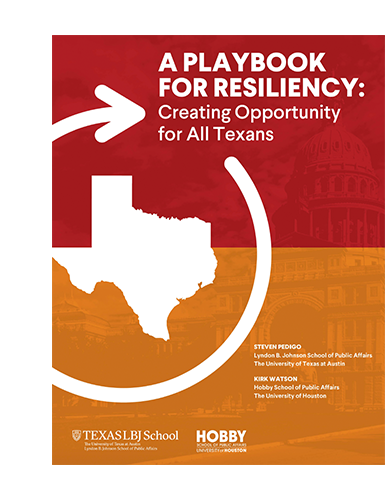
COVID-19 could spur innovations in economic development, health care, other services
As state leaders begin to restart the Texas economy, policy experts from the Lyndon B. Johnson School of Public Affairs at The University of Texas at Austin and the Hobby School of Public Affairs at the University of Houston have issued a nine-point playbook for rebuilding a more equitable and inclusive future Texas.
The report, "A Playbook for Resiliency: Creating Opportunity for All Texans," co-authored by Kirk Watson, founding dean of the Hobby School of Public Affairs, and Steven Pedigo, professor of practice and director of the LBJ School's Urban Lab, calls for state and local leaders to evaluate past policies and unequal growth.
"We have to learn from the COVID-19 pandemic to ensure that, going forward, our state is more resilient than it's ever been," said Watson, a former state senator who serves on Gov. Greg Abbott's Strike Force to Open Texas. "How we approach the challenge of recovery from the pandemic will define Texas going forward and whether it is stronger and better prepared for the future."
- Op-Ed: How Texas can improve its chances for post-pandemic economic recovery (Dallas Morning News, May 18, 2020)
- Texas Policy Experts Offer Playbook for Post-Pandemic Recovery (UT News, May 13, 2020)
The report (Executive Summary) notes that the disruption caused by the COVID-19 pandemic provides an opportunity to reshape the state’s approach to critical services ranging from healthcare and education to economic development for both urban and rural communities. It will also require Texas to discard the zero-sum approach that pits jurisdictions, regions and economic sectors against each other as it makes investments in economic, workforce and community development.
"Even in a downturn, Texas cannot afford to turn away from investment at this crucial time," said Pedigo, an economic development strategist who has advised communities across the world. "As important and urgent as it to reopen Texas, our ultimate challenge is to make our state stronger and more prosperous in the future. That starts with investing in polices and plans that put Texans first."
"As important and urgent as it to reopen Texas, our ultimate challenge is to make our state stronger and more prosperous in the future. That starts with investing in polices and plans that put Texans first."
—LBJ Urban Lab Director Steven Pedigo
The playbook outlines detailed steps to:
- Expand cooperation among local governments and between state and local efforts, including authorizing local governments to make decisions suited to their communities' needs
- Ensure the business climate supports small and local businesses, while also requiring that incentives to attract new companies achieve the goal of job creation
- Increase investment in health care, including public health and rural health care, to leverage the industry for economic development
- Lead the future of energy by supporting alternative energy research and adopting statewide energy efficiency goals
- Protect essential workers by ensuring access to health care, affordable child care and family-supporting wages
- Promote rural communities as centers for entrepreneurship through state investment
- Invest in workforce development, including better alignment between regional workplace needs and available training
- Leverage Texas universities as accelerators for talent and thought leadership
- Boost physical and digital infrastructure, including ensuring all Texans have broadband access
"Achieving the report's bold goals will be challenging," said Angela Evans, dean of the LBJ School. "But this innovative playbook from the LBJ Urban Lab and the Hobby School affords all of us – policymakers, business leaders and universities – strategies for achieving a bright future that celebrates Texas's creativity, scales our innovations and addresses our community vulnerabilities."
The playbook is intended to drive longer term action, allowing the state to maintain its traditional economic strengths while acknowledging that the old way of doing things didn’t work for everyone. It also acknowledges that the recommended policy changes will require thinking beyond the state’s traditional growth and economic power to consider who – and what geographic areas – have been left behind.
"If we want a more sustainable Texas, we have to move past the old either/or playbook," Watson said. "We have to make decisions that serve the state's long-term prosperity and quality of life."
COVID-19 revealed gaps in the state's ability to rebound from the pandemic. Prof. @iamstevenpedigo of @theLBJSchool, @UTAustin & @hobbyschooluh Dean @KirkPWatson have created a forward-thinking playbook to bring about a stronger Texas. https://t.co/xuVao9uqu1 pic.twitter.com/QVB0oF17jr
— The LBJ School (@TheLBJSchool) May 13, 2020
Reopen Texas? Policy experts from @hobbyschooluh and @TheLBJSchool say the state needs to evaluate past policies and better prepare for the future. https://t.co/v8l8lUC5B8
— UH Media Relations (@UH_News) May 13, 2020
Coronavirus in Texas: Policy experts from @hobbyschooluh and @TheLBJSchool have laid out a plan for the state's recovery https://t.co/F8kyJdZj4K via @TexasTribune
— UH Media Relations (@UH_News) May 13, 2020
.@KirkPWatson and I joined @TexasStandard to lay out a plan for a more resilient and inclusive #Texas after #COVID19. https://t.co/kJrq3fKL2T #cities #ecdev cc: @TheLBJSchool @hobbyschooluh
— Steven Pedigo (@iamstevenpedigo) May 13, 2020
Coronavirus in Texas: @KirkPWatson and @iamstevenpedigo lay out post-pandemic recovery plan. @hobbyschooluh @TheLBJSchool https://t.co/6yjKvnkQfZ via @TexasTribune
— Jeannie Kever (@JEKever) May 13, 2020
We need ideas to build better after COVID. Together, @KirkPWatson of @hobbyschooluh and @iamstevenpedigo of @TheLBJSchool lay out common sense steps policy and business leaders can take to emerge better. The advice will work for more than just Texas. https://t.co/ZRFwTbpDRL pic.twitter.com/Ik7PyxgC8t
— Joseph Kopser (@JosephKopser) May 14, 2020
"Let's be innovative in how we grow our export sectors when we begin to reopen the state, while supporting the
— Tom Kozlik (@tomkozlik) May 14, 2020
small and local businesses that bring character, creativity, and authenticity to our communities," @iamstevenpedigo @KirkPWatson @TheLBJSchool @UTAustin @hobbyschooluh https://t.co/XFv2MEzDlF
First of its kind playbook to get the Texas economy moving again—a must-read—- @GreeneBarrett @aspanational @VolckerAlliance @iamstevenpedigo https://t.co/W6M4I81ssg
— Don Kettl (@DonKettl) May 14, 2020
When @DonKettl says it is a must read - it is a must read. Printing now. thanks for pointing out @DonKettl.@GreeneBarrett @aspanational @VolckerAlliance @iamstevenpedigo @TheLBJSchool @UTAustin @hobbyschooluh @KirkPWatson #Texas https://t.co/UbBqVQcMhe
— Tom Kozlik (@tomkozlik) May 14, 2020
See Burnt Orange & Scarlet work beautifully together...@TheLBJSchool @hobbyschooluh teaming up to write the Playbook on TX resiliency as we navigate a post pandemic Texas https://t.co/8gjuB6Jlfs
— Victoria DeFrancesco (@DrVMDS) May 13, 2020
A Playbook for #Resiliency: New report from collaborative effort between @TheLBJSchool and @hobbyschooluh details 9 principles for more #resilient and #equitable #Texas economy. Investing in skills of #Texans a top priority.https://t.co/LhyDykG7z4 #TexasStrong #workforce pic.twitter.com/yP9W6ET9Hc
— Quo Vadis Strategies (@QVStrategies) May 13, 2020
About the Lyndon B. Johnson School of Public Affairs
The LBJ School, ranked No. 8 in the nation among graduate public affairs schools, makes a difference, not only within the walls of academia, but also in the public and social dialogue of the world. Contributing viable solutions to society is the LBJ School's legacy and its benchmark. Its effectiveness in channeling the purpose and passion of students into professional careers is evident in the success of more than 4,500 graduates who are the living legacy of President Johnson's bold and fearless action. The University of Texas at Austin is home to the LBJ School. Learn more: lbj.utexas.edu
About the University of Houston
The University of Houston is a Carnegie-designated Tier One public research university recognized with a Phi Beta Kappa chapter for excellence in undergraduate education. UH serves the globally competitive Houston and Gulf Coast Region by providing world-class faculty, experiential learning and strategic industry partnerships. Located in the nation's fourth-largest city and one of the most ethnically and culturally diverse regions in the country, UH is a federally designated Hispanic- and Asian-American-serving institution with enrollment of more than 46,000 students.
Media contact:
LBJ Urban Lab
Steven Pedigo, Director
pedigo@utexas.edu


